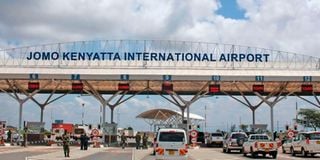
Motorists pass through security checks at the entrance of the Jomo Kenyatta International Airport in Nairobi.
Questions being asked about the proposal to lease Jomo Kenyatta International Airport (JKIA) to an Indian firm mirror concerns the auditor general flagged about a similar abortive deal involving Kenya Airways in 2018.
Kenya Airports Authority has confirmed receipt of an investment proposal from Adani Airport Holding Limited under the Public Private Partnerships Act 2021 “to invest in new passenger terminal building, second runaway and refurbishment of the existing facilities at JKIA.”
“I wish to assure our staff that no jobs are at risk,” Mr Henry Ogoye, acting KAA managing director said in a statement on July 24 in which he indicated the proposal will be subjected to technical, financial and legal reviews alongside requisite due processes in compliance with the act.
“The project agreement will be preceded by stakeholder engagement, the National Treasury approval, the Attorney General clearance and the Cabinet approval,” he added in a statement last Wednesday.
These assurances apparently target to pre-empt concerns including secrecy publicly raised about the new deal and also appear to address questions that surrounded the failed 2018 deal, which the then Auditor-General Edward Ouko criticised following a special audit.
Mr Ouko said the Joint Cabinet Memorandum presented by Cabinet Secretaries for National Treasury and Transport, Infrastructure and Housing and Urban Development, a letter dated May 29, 2018, from the Head of Public Service to Managing Directors of KAA and Kenya Airways as well as the Privately Initiated Investment Proposal (PIIP) submitted by Kenya Airways were never submitted to him for verification.
Lease out JKIA
Kisii Senator Richard Onyonka last Thursday demanded a statement in the Senate on the “leasing of JKIA to a private company.”
Mr Onyonka wants the standing committee on Roads, Transportation and Housing to inform the House whether a June 19th, 2018 report by the departmental committee on Transport, Public Works and Housing was adopted.
The report followed the inquiry into the proposed Kenya Airways’ privately initiated investment proposal to KAA.
The Senator wants KAA to confirm whether it had entered into an agreement with Adani Commercial Limited to lease out JKIA under the Build Operate Transform Model of Public-Private Partnerships (PPPs) and if so, state the terms of the agreement and indicate the associated costs to be incurred by the airlines and other users of JKIA, if any.
Mr Onyonka also wants the Senate furnished with contract documents of the agreement or any other agreement that had been signed and further information on the ownership of MS Adani Commercial Limited, the processes undertaken to identify and award the lease and state whether there was public participation in the process.
The Senator has also questioned whether there was a proper tendering process, details of the award of the contract, the number of bids received, the criteria used in selecting the company awarded and the cost of the award.
About the 2018 deal, the auditor-general found there was no evidence of the involvement of KAA management and the board in the Joint Cabinet Memorandum that was prepared and tabled in the Cabinet Meeting on May 29, 2018.
“There is no evidence that any feasibility study was carried prior to the joint Cabinet Memo,” stated the March 2019 special audit on the proposed public-private partnership between JKIA and Kenya Airways.
Mr Onyonka also wants the Senate furnished with details of the contract between the KAA and MENSES ALG, a Spanish company, that transacted as the advisor to the deal, indicating the ownership of the company, the processes undertaken to identify the award of the contract and the subsequent payment of the Sh160 million to the company.
On the KQ deal, the auditor general observed management did not provide satisfactory evidence as to why the restricted procurement method was used as opposed to open tendering while procuring the services of Transaction Advisor for a Contract Sum of Sh150,348,440.
The Senator has also demanded notices of meetings, the agenda and the minutes, and resolutions which the board of KAA passed on July 15, 2024.
Finally, My Onyonka has sought whether the Government plans, as it has been stated by the MOU that is publicly available, to offer free land to MS Adani for its developments and whether the Ministry of Land had been involved in the transaction.
In the 2018 deal, the auditor general noted there was no evidence of conduct of public participation and the results.
“More importantly, the reasoning and timing of the public participation appears misplaced or an afterthought,” the auditor general observed of a schedule released for the exercise.
In the end, the auditor general questioned the deal to hand Kenya Airways control of JKIA, which accounts for nearly 83 percent of KAA revenues and 51 percent of recurrent expenditure, noting the concession could deprive KAA of a significant amount of revenues.
With concession fees projected to peak at US$ 60 million (Sh6.1 billion in 2033), the auditor-general concluded: “The concession fee is inadequate to cover the cost of running KAA's other facilities.”
Mr Ouko, who left the office in 2020, found the business venture was unrealistic, questioning the rationale behind KQ relying on a concession fee to cover the cost of running KAA's other facilities.
He noted in the report that KQ’s proposal assumed KAA would retain all contingent liabilities including those rising from JKIA’s operations which was going to leave KAA worse off financially.
But what was the genesis of the deal to have KQ control of JKIA?
In the year ended December 2018, Kenya Airways had made a net loss of Sh5.9 billion from Sh5.1 billion in 2017. The loss before tax was Sh7.6b from Sh6.4b in the year ended December 2017.
The airline’s management defended the performance, attributing the loss to high fuel and staff costs. The carrier that has been on a loss-making streak in the last 10 years also said the numbers had plummeted because, in the year under review, it had spent a lot of money in maintaining its aircraft too.
The airline further said that the Financial Year ended December 2018 covered 12 months compared to nine months the previous year, which is the reason the result it posted could not give a true picture of its financial position.
"This therefore means that the 2018 results are not directly comparable with the 2017 results as it is a representative of 12 months against the 9 months in 2017," KQ’s long-serving Chairman Michael Joseph said during the release of the results then.
Investment Proposal
The poor performance of the airline was worrying the management. A year earlier, the airline had hired Mr Sebastian Mikosz, a Polish national, as its chief executive to turn around the company’s fortunes.
It’s against this background that on October 5, 2018, KQ initiated and submitted a Private Initiated Investment Proposal (PIIP) to Kenya Airports Authority (KAA) which entailed taking over the operations of JKIA to improve its cash flows.
Under the deal, KQ was to, through a special purpose vehicle, manage and develop JKIA at a concession fee for a period of 30 years.
This technically meant that KAA was to surrender an asset that generated close to 83 percent of its revenue to KQ, which was in the red, and shift its attention to low-yield airstrips spread across the country, a doomed business proposal that flopped.
In the KQ financial model, annual concession fees had been set at $.28 million (Sh2.9 billion) in 2019, rising to $ 35 million (Sh3.6 billion) in 2028 and only peaks at $ 60 million (Sh6.1 billion in 2033 i.e 15 years into the Concession term.
“KQ has not proposed a definite Capital Investment Programme on the life of the concession but has instead proposed the minimum Investment levels to be negotiated for inclusion in the Project Agreement,” says Mr Ouko in the report.
Interestingly, Mr Mikosz who eventually resigned in December 2019 before the end of his contract insisted that KQ could not make money if it was not approved to run the operations of JKIA.
“All the airlines that are struggling such as the South African Airline and Air Mauritius are working with a model that we currently do,” he said.










